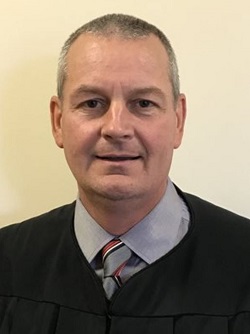In Minnesota, there are nearly 300 district court judges who preside over matters in ten judicial districts. While the Minnesota Rules of Court provide attorneys with significant information applicable to court proceedings, each judge may have his or her individual preferences with respect to motion practice and courtroom conduct.
In an effort to assist attorneys who may be appearing before a judge for the first time, the MSBA Civil Litigation Section Governing Council provided all district court judges with a brief survey. The responses that we received are organized on the right by judicial district and then alphabetically by judge’s name. We hope you find these responses to be helpful in your preparation for district court appearances.
For information about this project or to report an error in any judicial directory listing, contact Kara Haro, MSBA staff liaison to the Civil Litigation Section.
Get your third district guide for Amazon Kindle
here.
Third Judicial District Judges | Courtroom Preferences
Neisen, Christopher
District Court Judge
Counties: Wabasha
State Court Bio: View Bio

Contact with chambers:
- Set forth your preferred method to contact chambers (telephone, email, etc.).Email
- To whom may attorneys direct scheduling/logistical questions? Law clerk or court reporter
- To whom may attorneys direct substantive questions? Law clerk or court reporter
Motion practice:
- Set forth your practices and procedures for scheduling motion hearings. Per court administration
- Identify any type of motion for which you do not require a hearing.Case by case basis
- Do you accept telephone calls from attorneys to rule on discovery disputes that occur during depositions?Typically not available
- How much time do you allot for motion hearings?15 minutes
- Set forth your practices and procedures with respect to attending a hearing by telephone or video conference.Encouraged
- Set forth your practices and procedures with respect to discovery motions.Per Rules of Procedure
- Set forth your practices and procedures with respect to stipulations of the parties, including stipulations for protective orders. Case by case basis
- Do you have particular requirements or procedures relating to requests to amend the scheduling order? No
- Set forth your practices and procedures with respect to default proceedings.Per Rules of Procedure
- Set forth your practices and procedures with respect to handling emergency motions. Per Rules of Procedure
In-court proceedings:
- Identify what technology you use in the courtroom and state whether you prefer a particular electronic format. No preference
- Set forth your practices and procedures with respect to attorney's use of technology in the courtroom and during trial. Attorneys should practice on the equipment in advance
- Set forth your practices and procedures with respect to the submissions of additional legal authority or other materials at or after oral argument. Case by case basis
- Do you permit parties to bifurcate oral argument so different attorneys address different legal issues?Yes
Pretrial procedures:
- Describe your preferred procedures for pretrial settlement conferences, including the timing of such conferences, persons who must attend, whether persons may attend by telephone or video conference, and how you participate in settlement discussions. Case by case basis
- Set forth your practices and procedures for handling motions in limine. Well in advance of trial
- What is your schedule for a typical trial day?Begin 8:30 or 9:00 am. Breaks to handle in-custody proceedings or other urgent matters.
- Set forth your voir dire procedures.Per Rules of Procedure
- Set forth your practices and procedures with respect to courtroom decorum, including movement in the courtroom, use of a podium, whether attorneys should sit or stand, and how to address witnesses.Proper decorum is expected, with respect given to all
- Do you impose time limits with respect to opening statements and closing arguments? No
- Identify your practices with respect to the use of technology in the courtroom during trial.Per attorney preference
- Set forth your practices and procedures with respect to marking and using exhibits.In advance of Hearing/Trial
- Set forth your practices and procedures for handling objections. Objection followed by legal basis with no argument
- Set forth your practices and procedures with respect to the use of deposition testimony.Per Rules of Procedure
- May attorneys obtain daily transcripts during trial? If so, what procedure should attorneys follow? Notification to court reporter in advance
- Set forth your practices and procedures with respect to attorney requests to contact jurors at the conclusion of trial. Per attorney discretion